What is an Office 365 Administrator? Roles and Responsibilities.

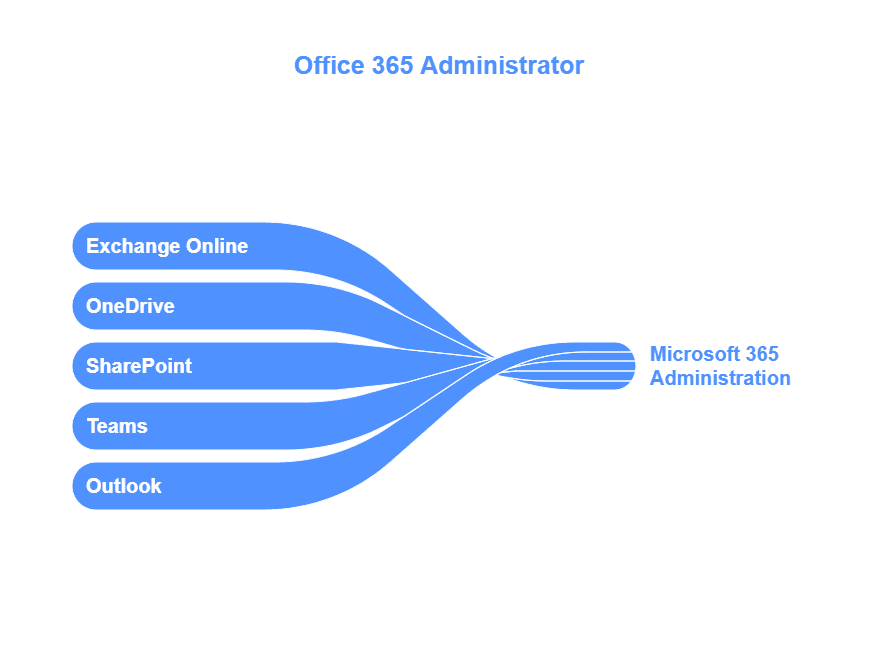
An Office 365 Administrator, also referred to as a Microsoft 365 Administrator, is responsible for managing and configuring Microsoft’s cloud-based productivity services.
These include Outlook, Teams, SharePoint, OneDrive, and Exchange Online — all accessed and controlled through the Microsoft 365 admin center.
In today’s cloud-driven world, businesses rely heavily on Microsoft 365 to power collaboration, communication, and productivity.
At the heart of this ecosystem is the Office 365 Administrator, a critical role responsible for managing and optimizing these cloud services.
Whether it’s configuring Teams for seamless meetings, securing sensitive data, or troubleshooting user issues, Office 365 Administrators ensure organizations run smoothly in the digital age.
This blog dives into the role, responsibilities, tools, and challenges of an Office 365 Administrator, offering a comprehensive guide for IT professionals, hiring managers, and businesses adopting Microsoft 365.
1.What is an Office 365 Administrator?
An Office 365 Administrator is an IT professional tasked with managing and configuring Microsoft 365 cloud services, including productivity tools like Exchange Online, Microsoft Teams, SharePoint, and OneDrive.
Their primary goal is to ensure these services are secure, accessible, and aligned with organizational needs. From creating user accounts to enforcing security policies, they play a pivotal role in maintaining a robust cloud environment.
Role in Modern Organizations
In modern workplaces, Office 365 Administrators are indispensable. They enable employees to collaborate seamlessly, whether through shared documents in OneDrive or virtual meetings in Teams. They also safeguard sensitive data by implementing security measures like multi-factor authentication (MFA) and data loss prevention (DLP).
As businesses increasingly adopt cloud solutions, the demand for skilled Office 365 Administrators continues to grow, with many organizations relying on them to bridge the gap between end-users and complex cloud infrastructure.
Office 365 vs. Microsoft 365: Clearing the Confusion
While the terms Office 365 and Microsoft 365 are often used interchangeably, they’re not identical. Office 365 refers to a suite of cloud-based productivity apps, such as Word, Excel, Outlook, and Teams.
Microsoft 365, however, is a broader platform that includes Office 365, plus additional features like advanced security, device management, and Windows 11 Enterprise.
Office 365 Administrators typically manage services under the Microsoft 365 umbrella, but their focus often centers on the core Office 365 apps and related cloud services. Understanding this distinction helps clarify the scope of their responsibilities.
Why It Matters
The role of an Office 365 Administrator is critical as businesses transition to cloud-based operations. Their expertise ensures minimal downtime, enhanced security, and optimized user experiences. Whether you’re an IT professional exploring this career path or a business leader evaluating your IT needs, understanding the Office 365 Administrator’s role is the first step to leveraging Microsoft 365 effectively.
Struggling to manage your Microsoft 365 environment? Let Medha Cloud’s expert Office 365 managed services take the burden off your team.
Get instant consultation via live chat to optimize your cloud setup!
2. Office 365 Administrator Job Description
An Office 365 Administrator oversees the configuration, maintenance, and security of Microsoft 365 services to support organizational productivity and compliance. They manage user accounts, assign licenses, configure cloud services like Exchange and Teams, and troubleshoot issues to ensure seamless operations. Collaborating with IT teams, HR, and compliance departments, they balance technical expertise with user support to keep the cloud environment running efficiently.
Real-World Expectations
Companies expect Office 365 Administrators to be proactive problem-solvers with a deep understanding of Microsoft 365’s capabilities. Beyond technical tasks like user management or service configuration, they often serve as the first point of contact for user issues, requiring strong communication skills.
Many organizations also look for admins who can optimize costs by managing licenses effectively and stay updated on Microsoft’s frequent feature updates. The role is dynamic, blending hands-on technical work with strategic planning to align cloud services with business goals.
Core Duties
Here’s a snapshot of what an Office 365 Administrator does:
- User Account Management: Create, modify, and delete user accounts, ensuring proper access to Microsoft 365 services.
- Service Configuration: Set up and maintain Exchange Online, SharePoint, Teams, and OneDrive for optimal performance.
- License Management: Assign and monitor licenses to control costs and ensure compliance.
- Security Implementation: Enforce MFA, DLP, and other security policies to protect data.
- Issue Resolution: Troubleshoot user problems, such as login failures or email delivery issues.
- Monitoring and Updates: Track service health and implement updates from Microsoft’s message center.
This role demands versatility, as admins juggle routine tasks with unexpected challenges, all while keeping the organization’s cloud environment secure and efficient.
Need a reliable Office 365 Administrator but don’t have the resources in-house? Medha Cloud offers managed services to handle all your Microsoft 365 needs. Reach out to streamline your operations!
Get instant consultation via live chat to optimize your Microsoft cloud setup!
3. Roles and Responsibilities
The responsibilities of an Office 365 Administrator are diverse, spanning user management, service configuration, and security enforcement. Below, we break down their key duties into logical categories to provide a clear picture of their day-to-day work.
User Management
Office 365 Administrators are responsible for managing user accounts to ensure employees have the right access to Microsoft 365 services. This includes:
- Account Creation and Deletion: Setting up accounts for new hires and removing access for departing employees.
- Password Resets: Assisting users with locked accounts or forgotten passwords.
- Multi-Factor Authentication (MFA): Enabling and managing MFA to enhance security during login.
- Onboarding/Offboarding: Streamlining access during employee transitions to maintain security and compliance.
Group Management
Groups in Microsoft 365 simplify collaboration and access control. Admins handle:
- Distribution Lists: Creating email lists for mass communication, such as company-wide announcements.
- Microsoft 365 Groups: Managing groups for Teams, SharePoint, and OneDrive to enable seamless collaboration.
- Permission Assignments: Ensuring groups have appropriate access to resources without compromising security.
License Management
Licenses are a significant cost factor in Microsoft 365, and admins optimize their usage by:
- Assigning Licenses: Allocating licenses based on user roles (e.g., E3 for standard users, E5 for advanced features).
- Revoking Licenses: Reclaiming unused licenses to reduce costs.
- Monitoring Usage: Generating reports to track license compliance and identify optimization opportunities.
Service Configuration
Admins configure and maintain core Microsoft 365 services, including:
- Exchange Online: Setting up email accounts, shared mailboxes, and retention policies.
- SharePoint Online: Creating sites for document storage and team collaboration.
- OneDrive: Configuring storage limits and sharing settings for individual users.
- Microsoft Teams: Managing settings for meetings, channels, and external access.
Security & Compliance
Security is a top priority, and admins implement measures like:
- MFA and DLP: Enforcing authentication and data protection policies.
- Permission Management: Restricting access to sensitive data based on roles.
- Compliance Audits: Using tools like Compliance Manager to meet regulations like GDPR or HIPAA.
Monitoring
Admins proactively monitor the health of Microsoft 365 services by:
- Health Dashboards: Checking for outages or performance issues.
- Message Center: Reviewing Microsoft’s updates on new features or service changes.
- Usage Reports: Analyzing adoption metrics to optimize service usage.
Support Handling
When users encounter issues, admins step in to:
- Resolve Tickets: Address problems like Teams login failures or Outlook sync errors.
- Escalate Issues: Work with Microsoft support or internal teams for complex problems.
These responsibilities highlight the multifaceted nature of the Office 365 Administrator role, requiring technical expertise, analytical skills, and a user-focused mindset.
Overwhelmed by Office 365 responsibilities? Medha Cloud’s managed services provide expert user management, security, and monitoring. Contact us to simplify your cloud administration!
4. A Tour of the Office 365 (Microsoft 365) Admin Center
The Microsoft 365 Admin Center is the nerve center for Office 365 Administrators, providing a web-based portal to manage users, services, and settings in one place. Accessible at admin.microsoft.com, this intuitive interface simplifies cloud administration, allowing admins to configure Microsoft 365 services, monitor health, and ensure compliance without needing advanced scripting knowledge. It’s designed to streamline tasks, making it an essential tool for both new and experienced administrators.
Key Sections of the Admin Center
The Admin Center is organized into several key sections, each tailored to specific administrative tasks:
Users: Add, edit, or remove user accounts, reset passwords, and manage MFA settings. This section is critical for onboarding new employees or updating access.
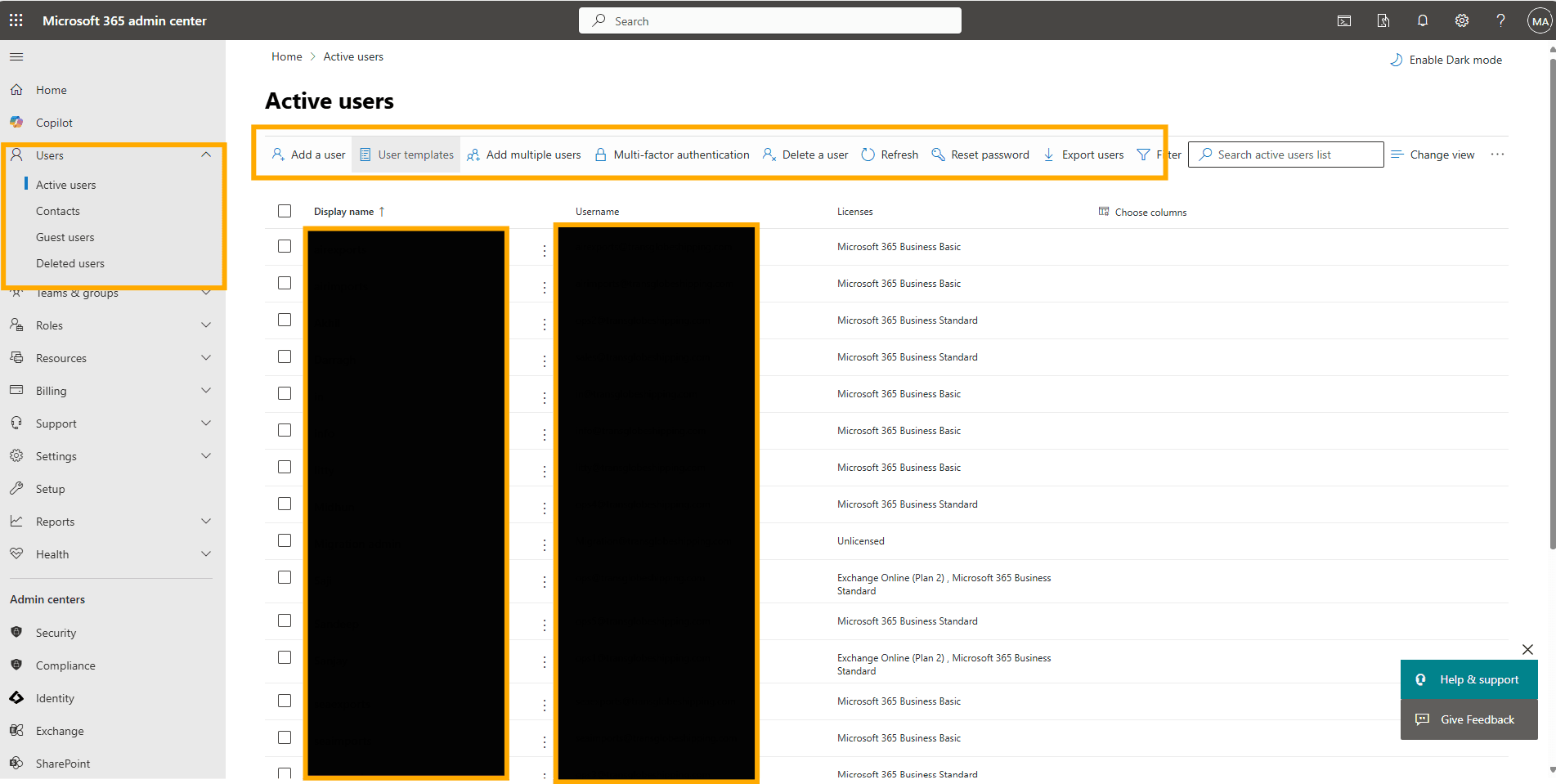
Groups: Create and manage Microsoft 365 groups, distribution lists, and security groups to control access to Teams, SharePoint, and other services.
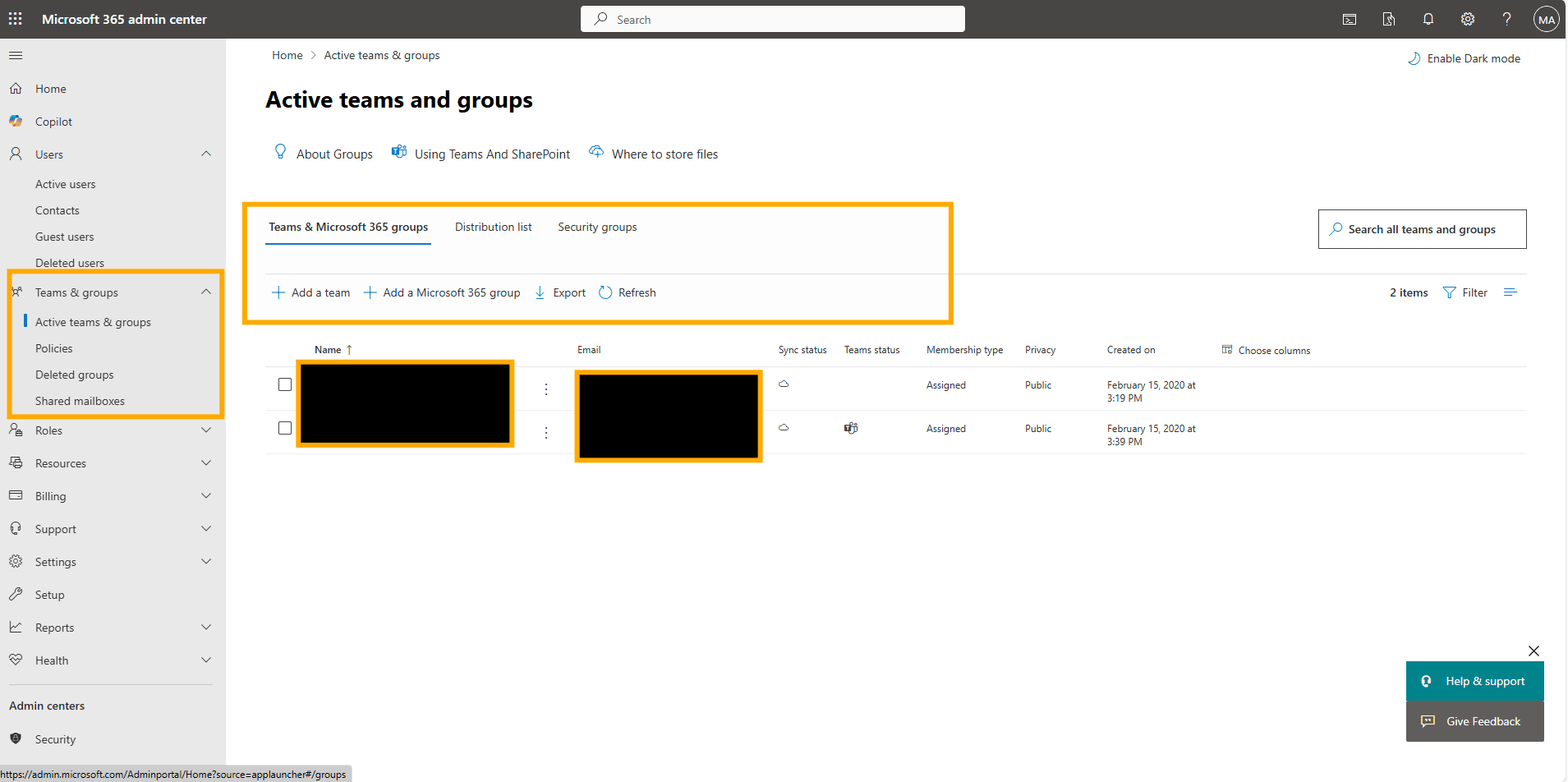
Billing: Monitor subscriptions, assign licenses, and review billing details to optimize costs.
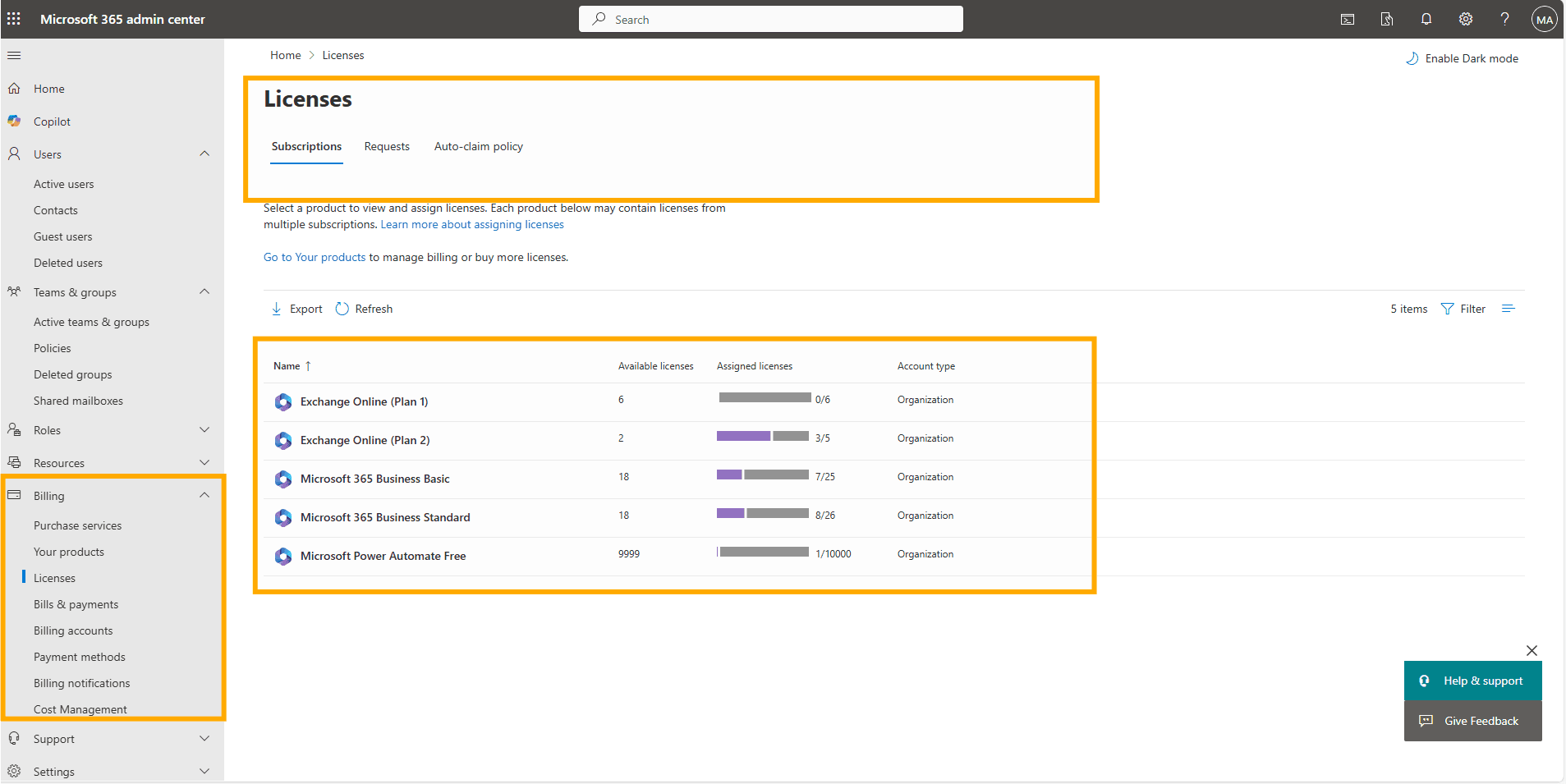
Setup: Access guided setups for configuring new services, such as Exchange Online or Teams, with step-by-step instructions.
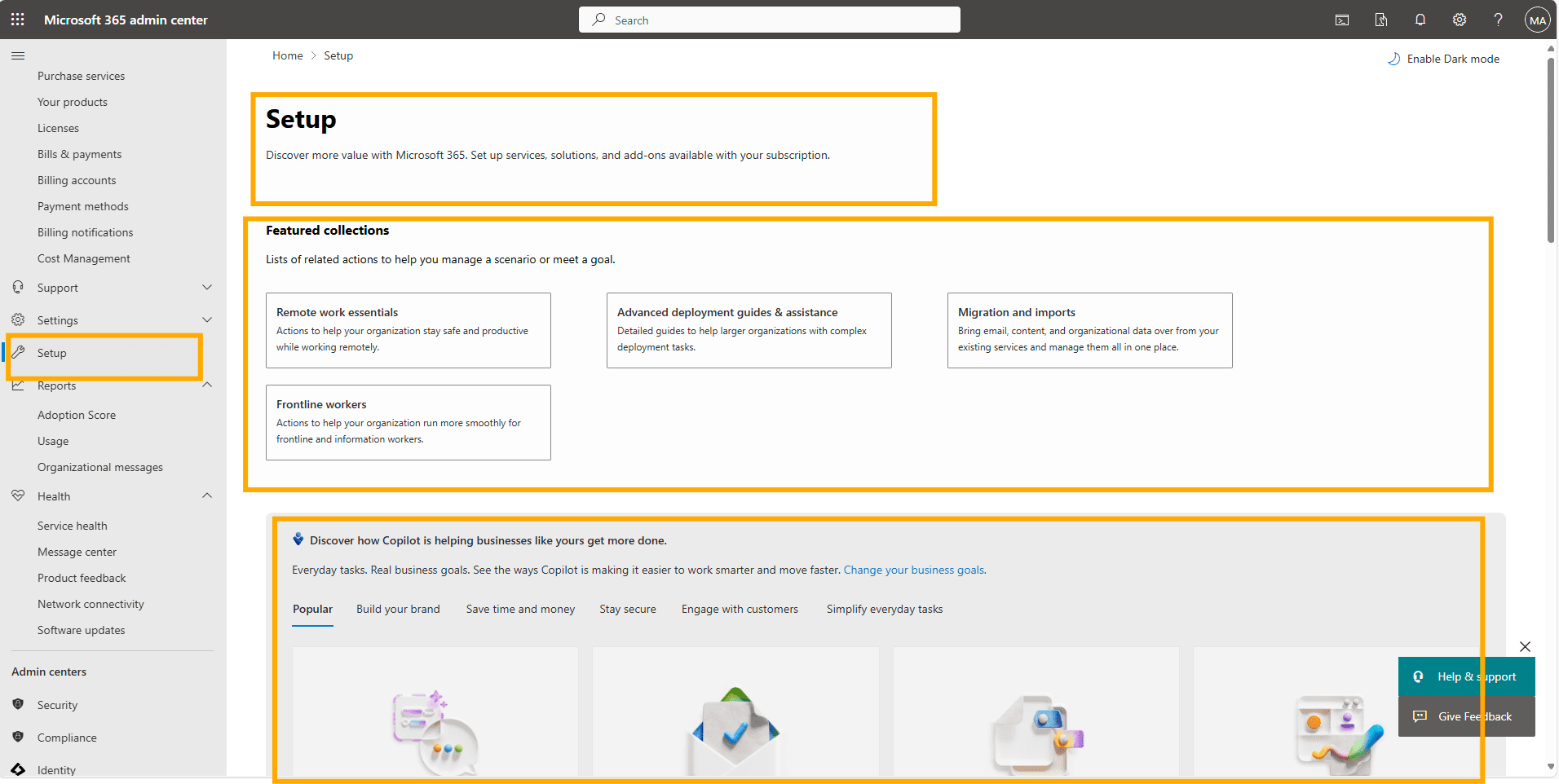
Health: View real-time service status, incident reports, and planned maintenance to stay informed about Microsoft 365 performance.
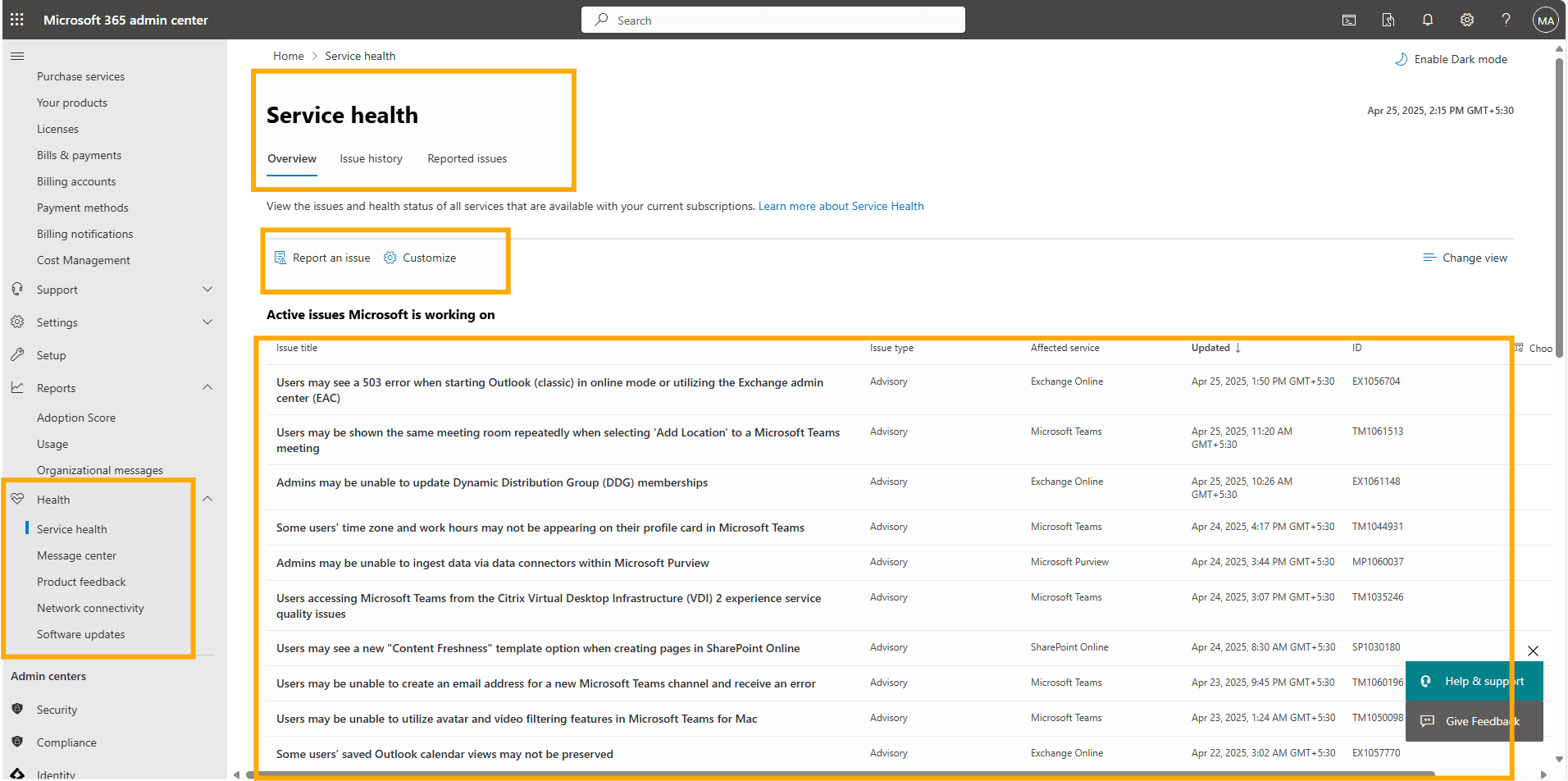
Reports: Analyze usage metrics, such as Teams adoption or email activity, to identify trends and optimize service delivery.
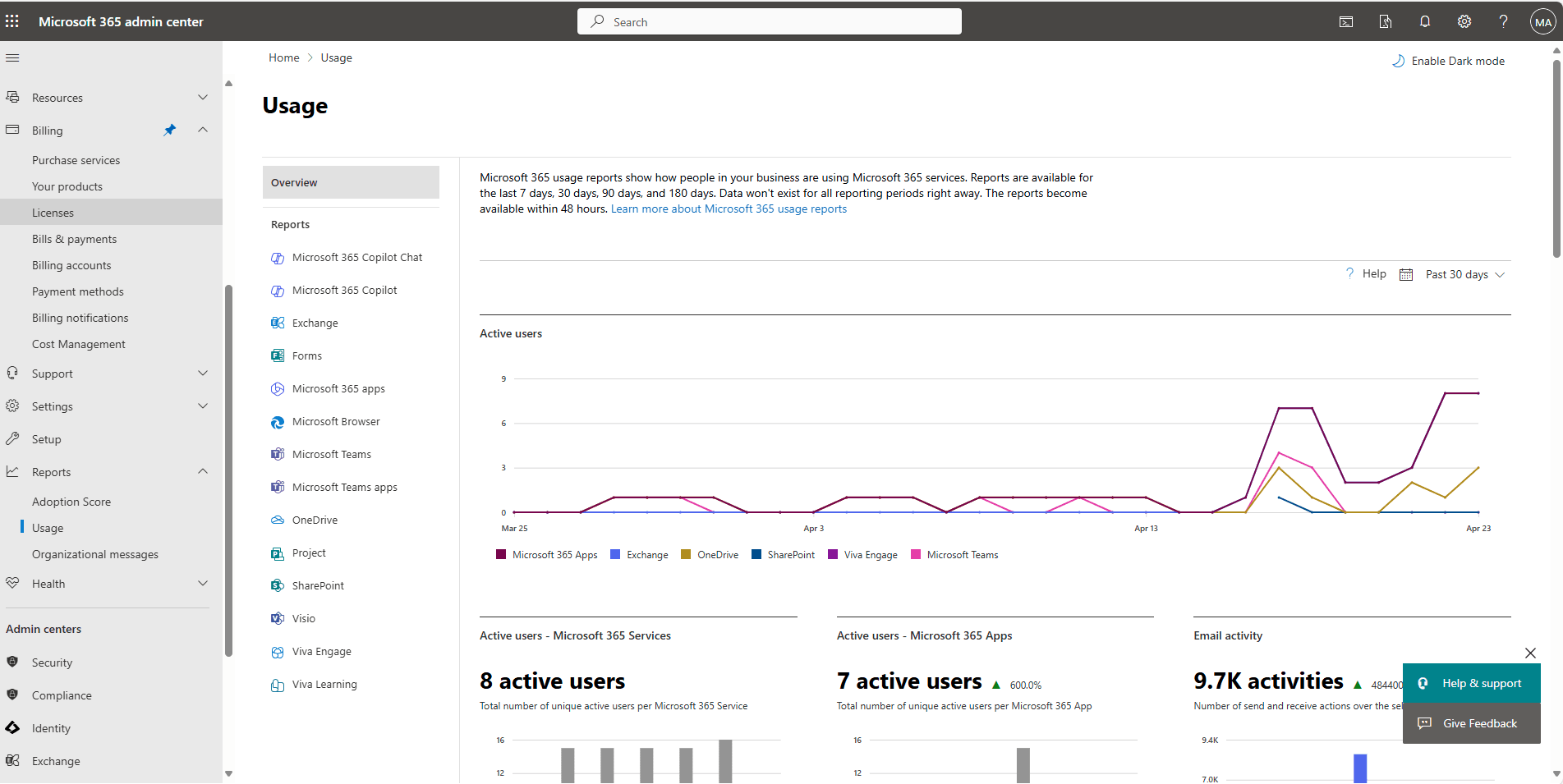
Security: Configure MFA, data loss prevention (DLP), and other compliance policies to protect organizational data.
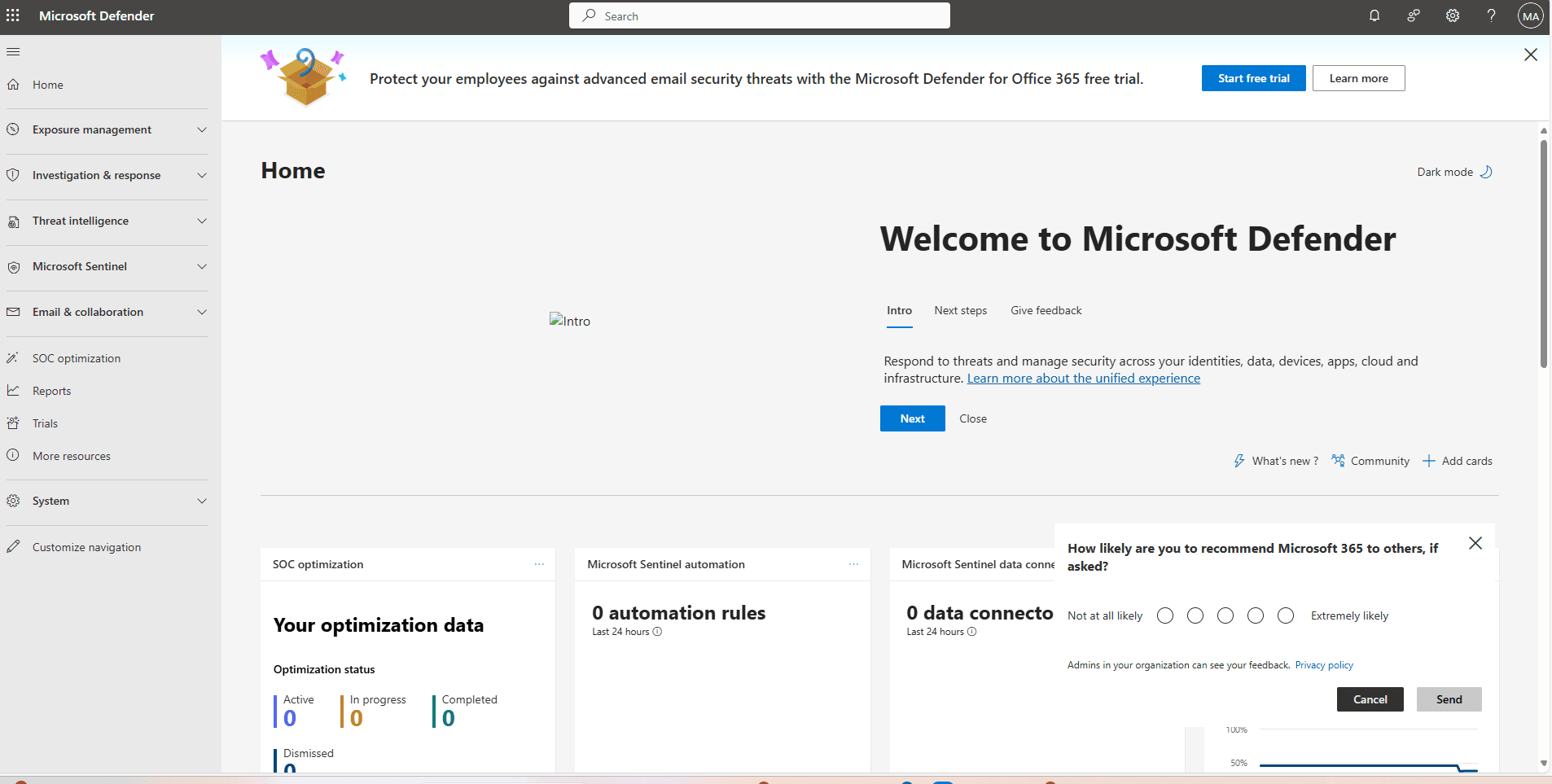
Simplifying Cloud Administration
The Admin Center’s user-friendly design reduces the learning curve for admins. Role-based access ensures that administrators only see the tools relevant to their permissions, enhancing security and efficiency. For example, a global admin has full control, while a user admin can only manage accounts. The portal also integrates with other Microsoft tools, like the Exchange Admin Center, for seamless navigation. Its search functionality and customizable dashboards make it easy to find and prioritize tasks, even in complex environments.
Mobile and Web Versions
Admins can access the Admin Center via a responsive web interface compatible with desktop browsers like Chrome, Edge, or Firefox. For on-the-go management, the Microsoft 365 Admin app (available on iOS and Android) allows admins to reset passwords, review alerts, or check service health from their mobile devices. This flexibility ensures administrators can respond to issues anytime, anywhere, keeping operations running smoothly.
Want to master the Microsoft 365 Admin Center without the hassle? Medha Cloud’s managed services ensure your Admin Center is optimized for efficiency. Get in touch for expert support!
5. Daily Tasks of an Office 365 Administrator
The daily life of an Office 365 Administrator is a blend of routine maintenance, user support, and proactive monitoring. Their tasks vary depending on organizational needs, but they typically focus on ensuring users can access Microsoft 365 services without disruption. Below are some of the most common daily responsibilities that keep the cloud environment humming.
Managing User Access and Passwords
A significant portion of an admin’s day involves handling user access issues. This includes:
- Password Resets: Assisting users who are locked out or have forgotten their passwords, often through the Admin Center’s “Reset Password” feature.
- MFA Management: Enabling or troubleshooting MFA for users, ensuring secure logins without excessive friction.
- Access Reviews: Verifying that users have appropriate permissions, especially during role changes or audits.
Creating Shared Mailboxes or Distribution Groups
Admins frequently set up collaboration tools to support teams or departments:
- Shared Mailboxes: Configuring mailboxes for shared use, such as a “support@company.com” address, accessible by multiple users.
- Distribution Groups: Creating email lists for announcements, like “allstaff@company.com,” to streamline communication.
- Microsoft 365 Groups: Setting up groups for Teams or SharePoint to enable project-based collaboration.
Enforcing Mailbox Storage Policies
Email storage is a common concern, and admins ensure compliance with organizational policies:
- Monitoring Mailbox Sizes: Checking for mailboxes nearing storage limits using Exchange Admin Center reports.
- Applying Retention Policies: Archiving or deleting old emails to free up space and comply with regulations.
- User Education: Guiding employees on managing their inboxes to avoid disruptions.
Troubleshooting Teams/Outlook Login Issues
When users encounter problems, admins are the first line of defense:
- Teams Issues: Resolving login failures, meeting access problems, or channel permission errors by checking user licenses and settings.
- Outlook Sync Errors: Diagnosing issues like email not syncing or calendar invites failing, often caused by misconfigured accounts or network issues.
- Quick Fixes: Using Admin Center tools or PowerShell to verify configurations and restore access.
Reviewing Admin Alerts and Compliance Messages
Proactive monitoring is key to preventing issues:
- Service Health Alerts: Checking the Admin Center’s Health dashboard for outages or performance degradation.
- Message Center Updates: Reviewing Microsoft’s announcements about new features, updates, or planned maintenance.
- Compliance Notifications: Acting on alerts about policy violations, such as unauthorized data sharing, to maintain security.
These tasks highlight the hands-on, user-focused nature of the role, requiring admins to balance technical expertise with responsiveness to keep Microsoft 365 services running smoothly.
Tired of handling daily Office 365 tasks? Let Medha Cloud manage user access, troubleshooting, and alerts for you. Contact us for seamless administration!
6. Key Tools Used by Office 365 Administrators
Office 365 Administrators rely on a suite of specialized tools to manage Microsoft 365 services efficiently. These tools range from user-friendly portals to powerful scripting environments, each designed to handle specific aspects of cloud administration. Below are the primary tools that every Office 365 Administrator uses to perform their duties.
Microsoft 365 Admin Center
The Microsoft 365 Admin Center is the primary interface for managing users, licenses, and services. It offers a centralized dashboard for tasks like adding users, assigning licenses, and monitoring service health. Its intuitive design makes it accessible for routine tasks, while advanced features like role-based access control ensure security.
Exchange Admin Center
The Exchange Admin Center (EAC) is a dedicated portal for managing email-related services in Exchange Online. Admins use it to:
- Configure shared mailboxes and distribution lists.
- Set email retention and archiving policies.
- Troubleshoot email delivery issues, such as spam filtering or routing errors.
PowerShell for Microsoft 365
PowerShell is a powerful scripting tool for automating complex or bulk tasks. With the Microsoft 365 PowerShell module, admins can:
- Perform bulk user management, like creating 100 accounts at once.
- Configure advanced settings not available in the Admin Center, such as mailbox permissions.
- Generate detailed reports on license usage or audit logs. For example, a simple PowerShell command like Set-MsolUserLicense can assign licenses to multiple users, saving hours of manual work.
Microsoft Defender Security Portal
The Microsoft Defender Security Portal helps admins protect the organization from threats. It’s used to:
- Monitor phishing, malware, and other security risks.
- Configure anti-spam and anti-malware policies.
- Review threat analytics to identify vulnerabilities.
Compliance Manager
Compliance Manager is a tool for assessing and improving compliance with regulations like GDPR, HIPAA, or ISO 27001. Admins use it to:
- Run compliance assessments and generate audit reports.
- Implement recommended actions, such as enabling DLP or encryption.
- Demonstrate compliance to stakeholders or regulators.
Azure Active Directory Basics
Azure Active Directory (Azure AD) is the backbone of user and group management in Microsoft 365. While not a primary tool for all admins, it’s used for:
- Managing user identities and group memberships.
- Configuring single sign-on (SSO) or conditional access policies.
- Syncing on-premises Active Directory with Azure AD in hybrid environments.
These tools, when used together, empower Office 365 Administrators to manage complex cloud environments efficiently, ensuring both functionality and security.
Need help leveraging Office 365 tools like PowerShell or Defender? Medha Cloud’s experts optimize your toolset for maximum efficiency. Reach out today!
7. Top Skills Required for Office 365 Administration
Being an effective Office 365 Administrator requires a diverse skill set that blends technical expertise, analytical thinking, and interpersonal abilities. These skills enable admins to manage Microsoft 365 services, troubleshoot issues, and support users across the organization. Below is a breakdown of the top skills, organized by category.
| Category | Examples |
|---|---|
| Technical | PowerShell scripting, navigating admin portals, managing user permissions |
| Analytical | Interpreting audit logs, analyzing health reports, identifying usage trends |
| Organizational | Optimizing licenses, structuring groups, prioritizing tasks |
| Communication | Explaining technical issues to non-technical users, collaborating with departments |
Technical Skills
Technical proficiency is the foundation of the role. Admins must be adept at:
- PowerShell Scripting: Automating tasks like bulk user creation or license assignments.
- Admin Portal Navigation: Using the Microsoft 365 Admin Center, Exchange Admin Center, and Defender Portal efficiently.
- Permission Management: Configuring role-based access and group permissions to secure data.
Analytical Skills
Admins need to analyze data to maintain and improve services:
- Audit Log Analysis: Reviewing logs to identify unauthorized access or policy violations.
- Health Reports: Interpreting service health dashboards to anticipate issues.
- Trend Identification: Using usage reports to optimize resource allocation, like reassigning underused licenses.
Organizational Skills
Managing a complex cloud environment requires strong organization:
- License Optimization: Monitoring and reallocating licenses to reduce costs.
- Group Structuring: Creating logical group hierarchies for Teams or SharePoint access.
- Task Prioritization: Balancing routine tasks with urgent user support requests.
Communication Skills
Admins often act as a bridge between IT and other departments:
- User Support: Explaining technical solutions, like MFA setup, in simple terms.
- Collaboration: Working with HR for onboarding or compliance teams for audits.
- Documentation: Creating clear guides or reports for stakeholders.
Why These Skills Matter
Technical skills ensure systems run smoothly, while analytical skills help admins stay proactive. Organizational skills streamline operations, and communication fosters collaboration across the organization. Together, these competencies make Office 365 Administrators indispensable for businesses relying on Microsoft 365.
Looking for skilled Office 365 Administrators? Medha Cloud provides trained experts with the technical and organizational skills you need. Contact us to enhance your team!
8. Common Challenges
The role of an Office 365 Administrator is rewarding but not without its challenges. Managing a dynamic cloud environment like Microsoft 365 requires adapting to frequent changes, balancing competing priorities, and resolving complex issues. Below are some of the most common hurdles Office 365 Administrators face and how they navigate them.
Frequent UI/UX and Feature Updates
Microsoft regularly updates the Microsoft 365 Admin Center and its services, introducing new features, redesigned interfaces, or modified workflows. While these updates enhance functionality, they can disrupt established processes. Admins must:
- Stay informed through the Message Center, which announces upcoming changes.
- Test new features in a sandbox environment to understand their impact.
- Update documentation and train users on new tools or interfaces.
For example, a recent redesign of the Teams admin settings might require admins to relearn navigation, slowing down routine tasks until they adapt.
Balancing Security Enforcement with User Convenience
Security is paramount, but overly strict policies can frustrate users. Admins often struggle to:
- Enforce multi-factor authentication (MFA) without causing login fatigue.
- Implement data loss prevention (DLP) policies that don’t block legitimate workflows.
- Educate users on security best practices, like recognizing phishing emails.
For instance, enabling MFA for all users might lead to complaints about extra login steps, requiring admins to communicate the importance of security while offering support for setup.
Handling Hybrid Environments or On-Prem Integrations
Many organizations operate hybrid environments, combining on-premises infrastructure with Microsoft 365. This introduces complexity, as admins must:
- Sync Azure Active Directory with on-premises Active Directory using tools like Azure AD Connect.
- Manage Exchange hybrid deployments to ensure seamless email flow between cloud and on-premises servers.
- Troubleshoot synchronization issues, such as user accounts not appearing in the cloud.
These tasks demand expertise in both cloud and legacy systems, making hybrid management a steep learning curve for some admins.
Troubleshooting Login, Sync, or Email Flow Issues
Technical issues are a daily reality, and some are particularly challenging:
- Login Failures: Diagnosing why a user can’t access Teams or Outlook, often due to misconfigured licenses, MFA issues, or network restrictions.
- Sync Errors: Resolving OneDrive or Outlook sync problems caused by corrupted local files or storage limits.
- Email Delivery Delays: Investigating why emails are stuck in queues, which may involve checking spam filters, DNS records, or connector settings.
Admins use tools like the Exchange Admin Center and PowerShell to trace issues, but resolving them often requires patience and methodical problem-solving.
These challenges highlight the need for Office 365 Administrators to be adaptable, technically skilled, and user-focused, ensuring they can keep the cloud environment functional despite obstacles.
Facing Office 365 challenges like hybrid setups or troubleshooting? Medha Cloud’s managed services resolve issues quickly. Get expert help today!
9. Conclusion: Why Office 365 Administrators Are Essential
The Office 365 Administrator is a linchpin in modern organizations, ensuring that Microsoft 365 services empower employees while safeguarding data and maintaining operational efficiency. Their work touches every aspect of the cloud environment, from configuring Teams for seamless collaboration to enforcing security policies that protect sensitive information. By managing user accounts, optimizing licenses, and resolving issues, they enable businesses to focus on their core objectives without worrying about technical disruptions.
Business Impact
Office 365 Administrators drive significant value by:
- Enabling Collaboration: They configure tools like Teams, SharePoint, and OneDrive to foster teamwork, whether employees are in the office or remote.
- Protecting Data Integrity: Through MFA, DLP, and compliance tools, they safeguard sensitive information against breaches and ensure regulatory compliance.
- Supporting Business Continuity: By monitoring service health and resolving issues quickly, they minimize downtime and keep operations running smoothly.
Their role is particularly critical in today’s digital-first world, where cloud services are the backbone of productivity. A skilled Office 365 Administrator can mean the difference between a thriving, secure workplace and one plagued by inefficiencies or vulnerabilities.
Ready to empower your business with expert Office 365 administration? Medha Cloud’s managed services ensure seamless Microsoft 365 operations. Contact us to get started!
10 .FAQ
What does an Office 365 Administrator do?
An Office 365 Administrator manages Microsoft 365 cloud services, including user accounts, licenses, and security settings. They configure tools like Teams, Exchange, and SharePoint, troubleshoot issues, and ensure compliance with organizational policies.
How do I access the Office 365 Admin Center?
Log in to admin.microsoft.com with admin credentials. You can also use the Microsoft 365 Admin app on iOS or Android for mobile access.
Is the Office 365 Admin Center the same as Microsoft 365?
No, Office 365 is a subset of Microsoft 365, focusing on productivity apps. The Microsoft 365 Admin Center manages both Office 365 and additional Microsoft 365 services, like security and device management.
What are common tools used by Office 365 Admins?
Key tools include the Microsoft 365 Admin Center, Exchange Admin Center, PowerShell for Microsoft 365, Microsoft Defender Security Portal, Compliance Manager, and Azure Active Directory for user management.
Can an Office 365 Admin manage security settings?
Yes, admins configure security settings like multi-factor authentication (MFA), data loss prevention (DLP), and permission policies to protect data and ensure compliance.

Sreenivasa Reddy G
Founder & CEO • 15+ years
Sreenivasa Reddy is the Founder and CEO of Medha Cloud, recognized as "Startup of the Year 2024" by The CEO Magazine. With over 15 years of experience in cloud infrastructure and IT services, he leads the company's vision to deliver enterprise-grade cloud solutions to businesses worldwide.
